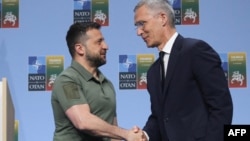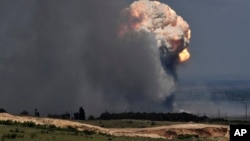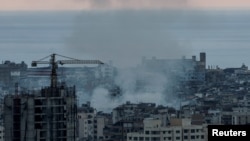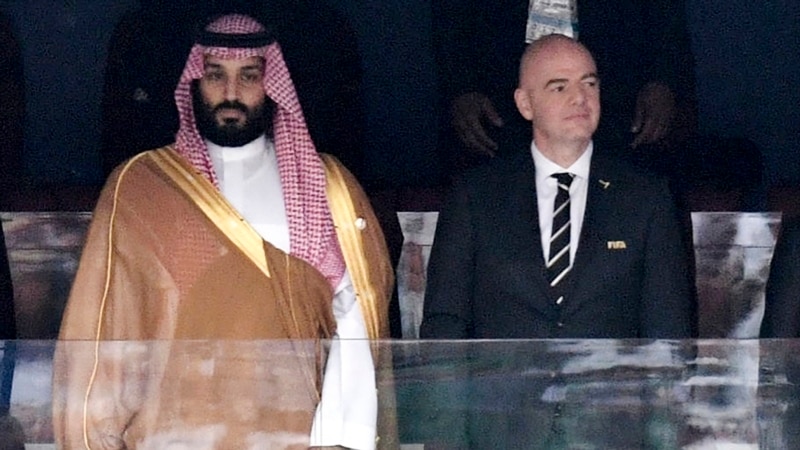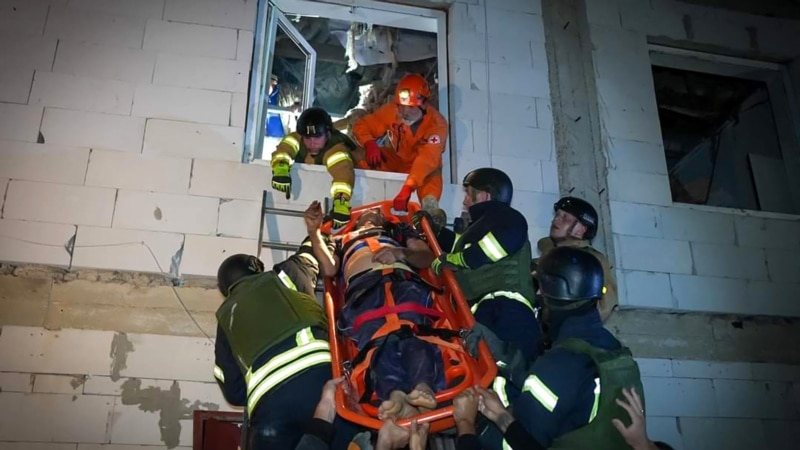- The United States plans to announce as soon as Tuesday a new military aid package for Ukraine of up to $400 million, including artillery, air defense missiles and ground vehicles as Ukraine’s counteroffensive grinds on, three U.S. officials said Friday. The package will not include cluster munitions.
- Russian President Vladimir Putin told a meeting of his Security Council in televised remarks that any aggression by Poland against Russia’s neighbor and close ally Belarus would be considered an attack on Russia. Poland denies any territorial ambitions in Belarus.
- The British Defense Ministry said Saturday in its daily intelligence report on Ukraine that the arrest of leading nationalist military blogger Igor Girkin, a critic of the Russian military’s conduct of the war and recently of President Putin, will likely “infuriate” military bloggers, who view Girkin as “an astute military analyst and patriot.”
Ukrainian President Volodymyr Zelenskyy spoke Saturday with NATO chief Jens Stoltenberg about ways to restore the Black Sea Grain Initiative.
The U.N. brokered accord, which expired Monday, guaranteed safe passage to ships transporting grain and other agricultural commodities from Ukrainian ports through the Black Sea corridor.
Zelenskyy said he and Stoltenberg “determined the priority and future steps necessary for the unblocking and sustainable functioning of the Black Sea grain corridor.”
Zelenskyy also discussed the grain deal Friday with Turkish President Recep Tayyip Erdogan.
“We coordinated efforts to restore the operation of the Black Sea Grain Initiative. Due to Russia’s actions, the world is once again on the brink of a food crisis. A total of 400 million people in many countries in Africa and Asia are at risk of starvation,” Zelenskyy said.
Since the expiration of the grain deal, Moscow has declared large areas of the Black Sea dangerous for shipping and has targeted Ukrainian ports with drones and missiles, destroying 60,000 metric tons of grain.
Moscow has warned that it would assume that ships crossing parts of the Black Sea would be carrying weapons to Ukraine. Similarly, Ukraine said vessels heading to Russian Black Sea ports would be considered “carrying military cargo with all the associated risks.”
Since the grain deal expired, the number of ships loading grain from the Black Sea area has fallen by 35%. As uncertainty grows over whether commercial traffic could be hit by Russia, shipping insurance companies have suspended coverage for shipments from Ukraine apart from the smaller ports along the Danube, insurance industry sources said Friday.
Despite the risks, some ship owners are still interested in shipping grain from Ukrainian ports to the world.
“Shipping has always been very, very resilient in the face of these sorts of risks,” said John Stawpert, senior manager of environment and trade for the International Chamber of Shipping, which represents 80% of the world’s commercial fleet.
Vessels crossing the Black Sea are likely to encounter mines and could become collateral damage at ports or a direct target of Russian strikes, which Stawpert said would lead to ” a huge escalation.”
“It is unlikely that underwriters will want to cover that risk,” said the International Union of Marine Insurance, which represents national and international marine insurers.
In an interview with VOA’s Russian Service, USAID Deputy Administrator Isobel Coleman said the U.S. agency has been assisting Ukraine in exporting grain via alternate routes through Poland and other countries, as well as the Danube River.
Coleman said these alternate routes are not as “cost efficient and not as fast as transporting in big bulk carriers from the Black Sea, and it has caused some friction with its neighbors.” Overland Ukrainian grain exports can adversely affect grain prices of Ukraine’s European neighbors, which see their agricultural products depreciate.
But Coleman emphasized it is important to use these alternate distribution routes so that “[Russian President Vladimir] Putin’s blackmail, his destruction will not undermine Ukraine’s agricultural sector.”
Crimea
Ukraine said its army had destroyed an oil depot and Russian army warehouses in what it called the “temporarily occupied” district of Oktyabrsky in central Crimea.
The attack caused an explosion at the depot, said Russian-installed governor Sergei Aksyonov, adding that no damage or casualties were reported. Footage shared by state media showed a thick cloud of gray smoke at the site.
The attack prompted an evacuation in the area and brief suspension of the road traffic on the Crimean bridge, linking the peninsula to Russia, the region’s Moscow-installed governor said Saturday.
Zelenskyy said Friday the Crimea Bridge is a legitimate target.
The bridge that links Crimea to Russia was hit Monday with explosions that killed two people. Following the attack, a portion of the bridge was put out of commission.
Speaking Friday by video link to the Aspen Security Conference in the U.S., Zelenskyy said, “This is the route used to feed the war with ammunition and this is being done on a daily basis and it militarizes the Crimean Peninsula.”
VOA National Security Correspondent Jeff Seldin, VOA Pentagon Correspondent Carla Babb, VOA White House Correspondent Anita Powell, U.N. Correspondent Margaret Besheer, VOA’s Anna Chernikova in Kyiv, and VOA’s Mykhailo Komadovsky contributed to this story. Some information was provided by The Associated Press, Agence France-Presse and Reuters.

